The words we choose can either open doors or reinforce barriers — and as entrepreneurs, creators, and leaders, it's up to us to build spaces where everyone feels seen, respected, and valued. That’s where this Inclusive Language Guide comes in.
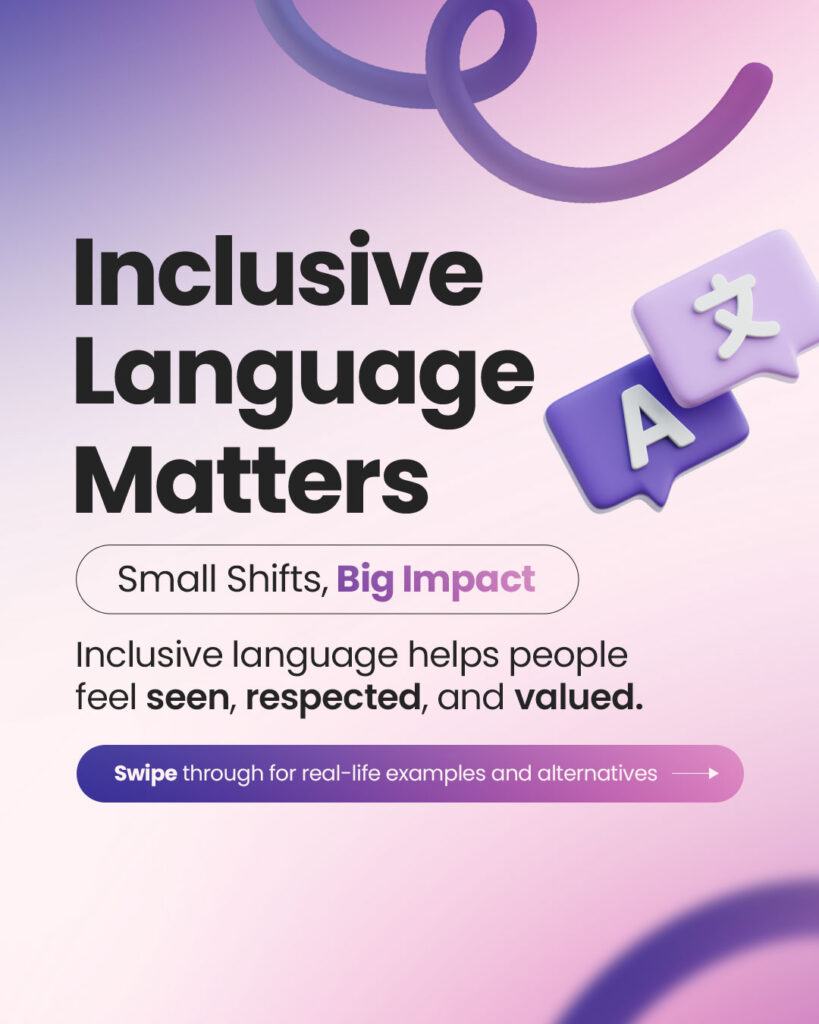
Inclusive language isn't about being “perfect” or walking on eggshells. It's about being intentional, compassionate, and aware of how language shapes the world around us. It's about challenging old systems that hurt people — and using words to build new, better ones.
In this Inclusive Language Guide, you'll find real-world examples of outdated and harmful terms, plus simple, thoughtful alternatives you can start using today. Whether you're writing content, hosting events, chatting with clients, or just updating your website, these small shifts can create a huge impact.
Bookmark this page — I'll keep updating it as language evolves (because growth is a forever thing around here). Plus, I'll link to additional resources if you want to dive deeper into creating truly inclusive, ethical, and accessible communications.
Ready to rethink the way we speak and connect? Let’s get into it!
Prioritize Gender-Inclusive Language
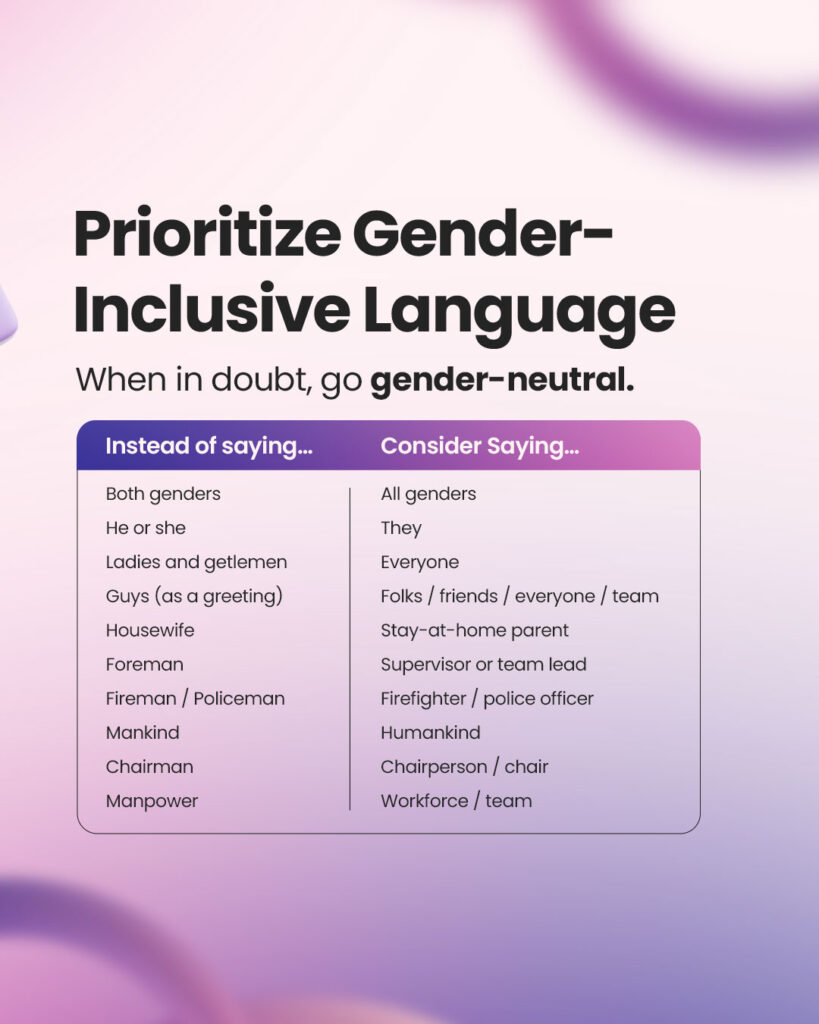
For too long, everyday language has centered the gender binary — assuming everyone fits neatly into “male” or “female.” But gender is a spectrum, and using gender-inclusive language helps ensure that everyone, regardless of identity, feels acknowledged and respected.
It’s not just about being “politically correct” — it’s about creating welcoming environments where people don't have to wonder if they belong. Small changes in your greetings, job titles, and descriptions can make a big difference in making your community more inclusive.
Here are some common examples:
Instead of saying: Consider saying: Why it matters: Both genders All genders Recognizes that not everyone is male or female. He or she They Inclusive of all gender identities. Ladies and gentlemen Everyone / Distinguished guests Welcomes all, without gendered expectations. Guys (as a general greeting) Folks / Friends / Team / Everyone Avoids male-centered language in mixed groups. Housewife Stay-at-home parent Acknowledges the role without assuming gender. Foreman Supervisor / Team Lead Updates outdated, gendered job titles. Fireman / Policeman Firefighter / Police Officer Focuses on the job, not the gender. Mankind Humankind / Humanity Centers all people, not just men. Chairman Chairperson / Chair Gender-neutral leadership language. Manpower Workforce / Team Inclusive of everyone’s contributions.
Ditch Outdated and Offensive Terms
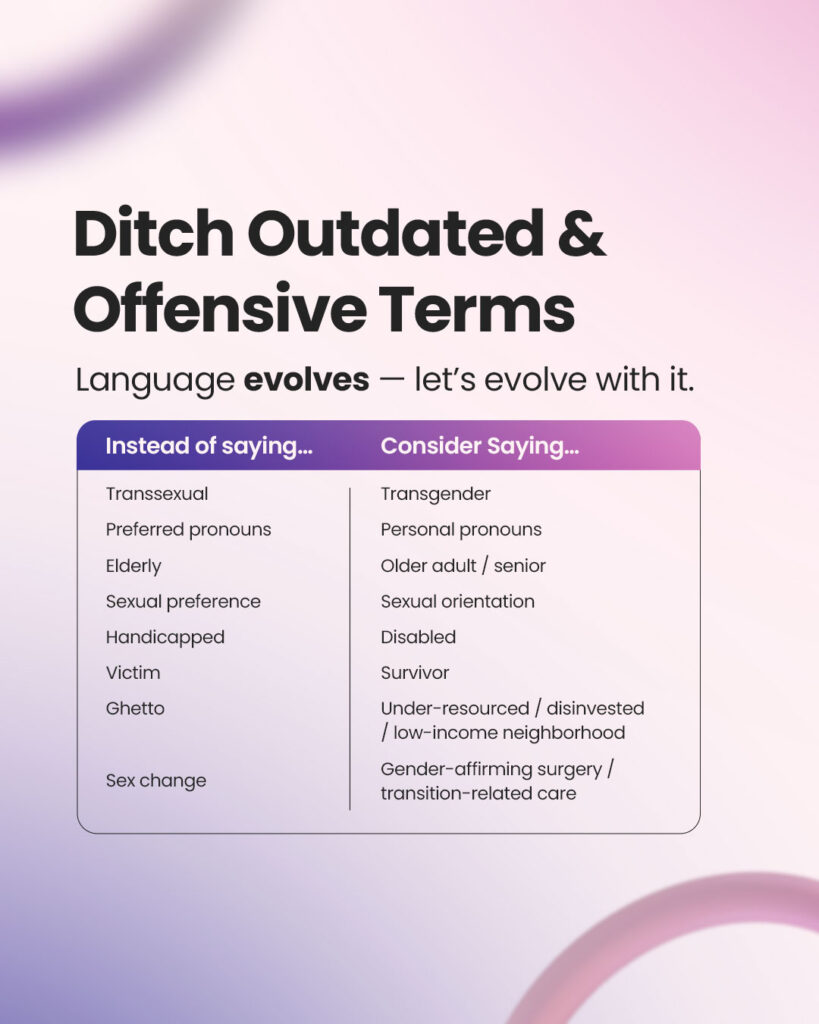
Language evolves — and that's a good thing. Some words that were once commonly used are now recognized as harmful because they carry histories of stigma, violence, or dehumanization. Updating our language isn’t about policing speech; it’s about showing respect, care, and awareness toward the people we're speaking to and about.
By swapping out outdated terms for more current, affirming alternatives, we send a powerful message: You are seen. You are respected. You belong here.
Here are some common swaps to consider:
Instead of saying: Consider saying: Why it matters: Transsexual Transgender “Transsexual” is outdated and often pathologizing. Preferred pronouns Personal pronouns / Pronouns Pronouns aren't a preference — they're part of someone's identity. Elderly Older adult / Senior “Elderly” can sound dismissive or patronizing. Sexual preference Sexual orientation Orientation is inherent, not a preference. Handicapped Disabled “Handicapped” is outdated and can feel dehumanizing. Victim (of trauma or condition) Survivor / Person impacted by [trauma/condition] Centers resilience and agency rather than helplessness. Hermaphrodite Intersex “Hermaphrodite” is outdated, inaccurate, and offensive. Mentally retarded Person with an intellectual disability Replaces a slur with respectful, people-first language. Wheelchair-bound Wheelchair user / Person who uses a wheelchair Highlights mobility and autonomy, not limitation. Committed suicide Died by suicide / Lost to suicide Reduces stigma by avoiding language of criminality or blame. Grandfathered / Grandfather clause / Grandfathering Legacy / Legacy Plan / Existing agreement “Grandfather” references post-slavery laws used to exclude Black Americans from voting. Master bedroom Primary bedroom “Master” evokes histories of enslavement and hierarchy. Blacklist / Whitelist Blocklist / Allowlist / Denylist / Safelist Reinforces harmful associations of “black” as bad and “white” as good — racialized coding.
Avoid Assumptive Language
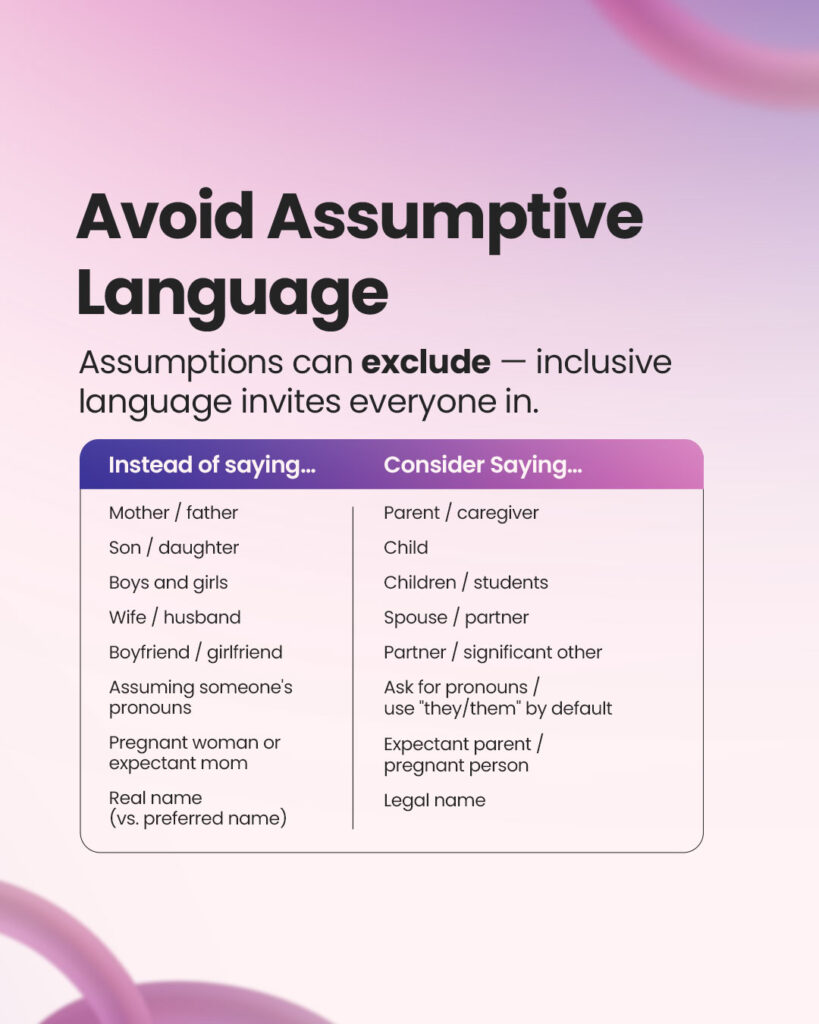
A lot of everyday language quietly makes assumptions about people’s identities, families, abilities, and experiences — often without us even realizing it. When we default to words that assume gender, relationship status, neurotypicality, or family structure, we risk excluding or alienating people whose lives look different from the “default” narratives society has normalized.
Choosing open, non-assumptive language invites more people into our spaces and conversations. It tells your community: You don’t have to fit into a box to belong here.
Here are some examples of assumptions we can rethink:
Instead of saying: Consider saying: Why it matters: Husband / Wife Spouse / Partner Avoids assuming gender or marital status. Mom / Dad Parent / Caregiver Includes diverse family structures. Boys and girls Children / Kids / Friends / Students Welcomes gender-diverse children. Son / Daughter Child / Young person Supports non-binary and gender-expansive families. Boyfriend / Girlfriend Partner / Significant other Inclusive of LGBTQIA+ relationships. Expecting moms Expecting parents / People who are pregnant Not all pregnant people identify as women. Breastfeeding Chestfeeding / Nursing Recognizes and respects gender-diverse parents. You guys (as a greeting) Y'all / Folks / Team / Friends Moves away from male-centered defaults. Real name (on forms) Legal name / Name on ID Respects chosen names, especially for trans and non-binary people. Preferred pronouns Personal pronouns / Pronouns Reflects that pronouns are part of identity, not a preference.
Rethink Ableist Language
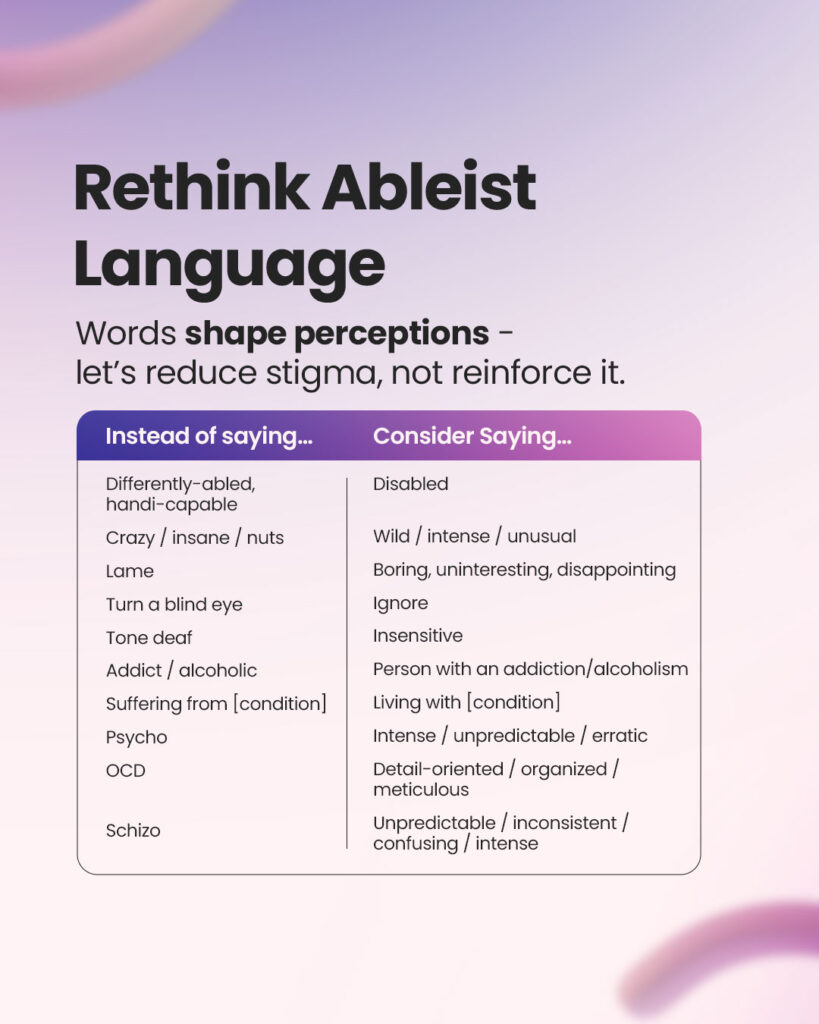
Ableism — discrimination or prejudice against disabled people — shows up in language more often than most of us realize. Words and phrases that frame disability as something negative, pitiful, or broken can be deeply harmful, even when they're used casually or with no bad intent.
By choosing words that honor disability as part of human diversity (instead of something to be “fixed” or “pitied”), we help create a world that's more accessible, respectful, and affirming for everyone. Inclusive language matters not just in disability spaces, but everywhere we show up and communicate.
Here are some examples of ableist terms to rethink:
Instead of saying: Consider saying: Why it matters: Differently abled / Handi-capable Disabled Euphemisms can feel minimizing — many people proudly identify as disabled. Crazy / Insane / Nuts Wild / Intense / Unusual / Impressive Casual use of mental health terms stigmatizes real conditions. Lame Boring / Disappointing / Underwhelming “Lame” is ableist and devalues disabled experiences. Turn a blind eye Ignore / Overlook Ableist phrase that uses disability as a metaphor for ignorance. Tone deaf Insensitive / Out of touch Reduces a sensory condition to a judgment about empathy. Addict / Alcoholic Person with a substance use disorder / Person living with alcoholism Centers humanity, not the condition. Suffering from [condition] Living with [condition] Focuses on agency rather than victimhood. High-functioning / Low-functioning Person with support needs / Person who needs minimal support Avoids ranking or minimizing disabled experiences. Invalid (referring to disability) Person with a disability “Invalid” implies a person lacks value — deeply harmful framing. Mute Non-speaking person / Person who uses AAC Respectful, accurate descriptions without stigma. Psycho Intense / Unpredictable / Erratic Reduces stigma by avoiding casual use of mental health diagnoses as insults. OCD Detail-oriented / Organized / Meticulous Avoids trivializing a serious mental health condition by using it casually. Schizo Unpredictable / Inconsistent / Confusing / Intense “Schizo” is a slur that dehumanizes people living with schizophrenia.
Watch for Cultural Appropriation
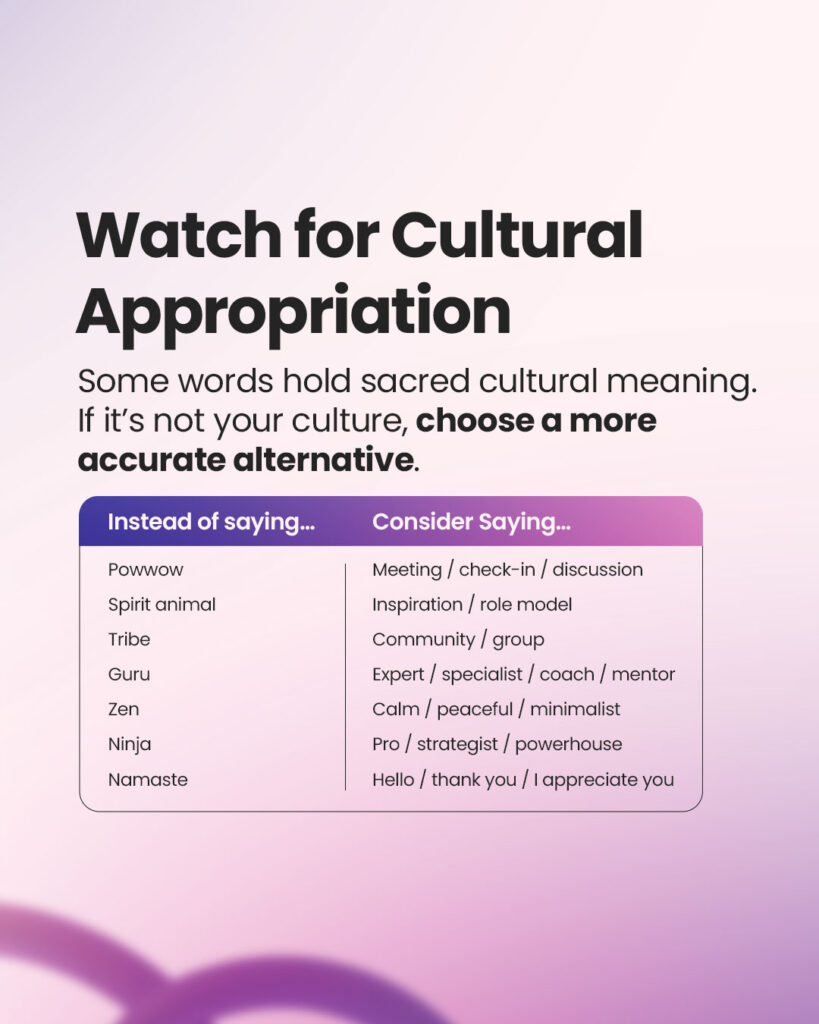
Culture is not a costume, a brand aesthetic, or a buzzword. When words, symbols, or traditions from marginalized cultures are borrowed without understanding or respect — especially for profit or trendiness — it’s cultural appropriation.
Using culturally significant language or practices without proper context can feel disrespectful, erase important histories, and reinforce harm against the very communities from which they came. Being mindful helps ensure we're appreciating cultures — not exploiting them.
Here are some commonly appropriated terms and respectful alternatives:
Instead of saying: Consider saying: Why it matters: Spirit animal Inspiration / Role model / Inner guide “Spirit animal” holds sacred meaning in many Indigenous cultures. Tribe (e.g., my biz tribe) Community / Group / Circle “Tribe” has deep cultural and political significance for Indigenous peoples. Powwow (for meetings) Gathering / Meeting / Check-in Powwows are ceremonial events, not casual business meetings. Guru (in business marketing) Expert / Specialist / Mentor “Guru” is a revered spiritual title in Hinduism and Sikhism. Chief (e.g., marketing chief) Lead / Director / Head “Chief” is a leadership title with deep Indigenous roots. Zen (as slang) Calm / Minimalist / Peaceful Zen is a sacred Buddhist tradition, not just a vibe. Ninja (e.g., marketing ninja) Pro / Strategist / Expert Using “ninja” casually erases cultural and historical meaning. Shaman Healer / Energy worker (unless referring accurately to Indigenous traditions) “Shaman” is a specific spiritual role, not a general healer. Namaste (casually) Hello / Thank you / I appreciate you “Namaste” is a sacred greeting — not just a trendy sign-off. Samurai (as metaphor) Loyal / Protector / Dedicated Avoid reducing historical identities into casual metaphors.
Question Normative Language
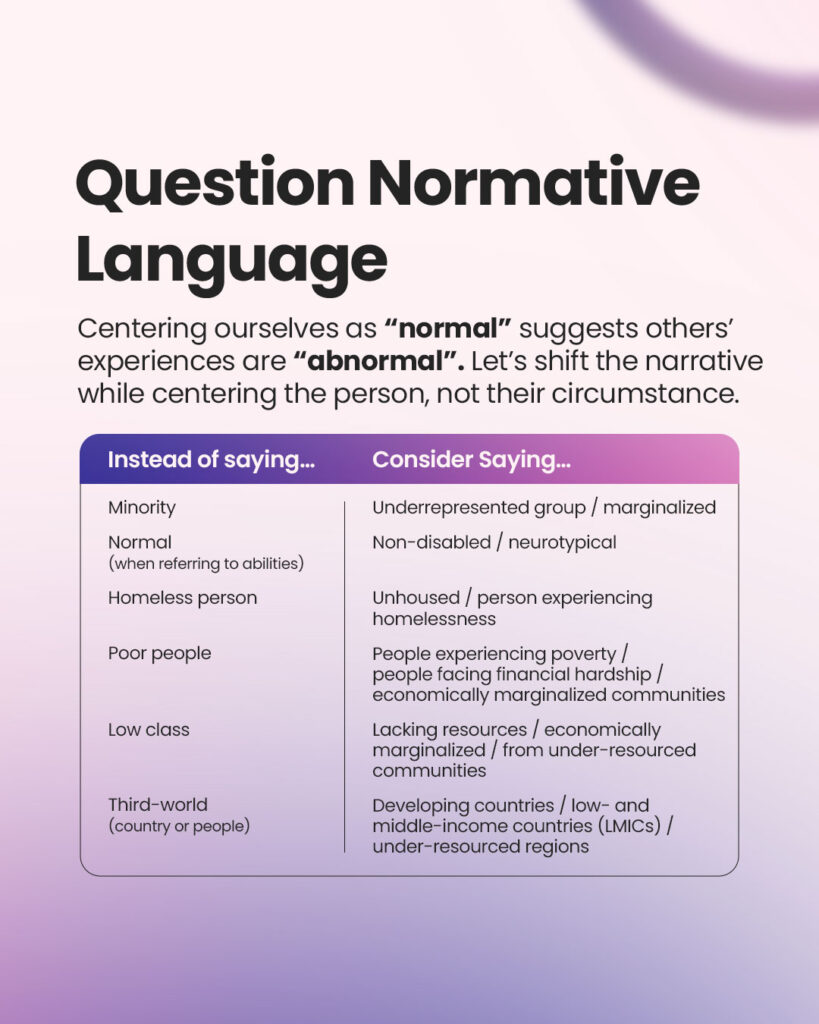
Normative language reflects and reinforces dominant cultural norms — often unintentionally positioning anything outside those norms as “less than” or “abnormal.” This can quietly uphold systems of oppression, create feelings of exclusion, and perpetuate harmful stereotypes.
By choosing words that recognize diversity as natural and valuable, we can challenge these harmful defaults and build more affirming, inclusive spaces.
Here are some common examples of normative language to rethink:
Instead of saying: Consider saying: Why it matters: Minority Underrepresented group / Marginalized “Minority” reinforces the idea of being less than or “othered” and centers whiteness or dominant groups as the norm. Normal (when referring to abilities) Non-disabled / Neurotypical “Normal” implies that disabled or neurodivergent people are abnormal, reinforcing harmful stereotypes. Homeless person Unhoused person / Person experiencing homelessness Centers the person, not their housing status — language that reduces stigma. Poor people People experiencing poverty / People with low income / Economically marginalized communities / People facing financial hardship Avoids defining people by economic status and focuses on systemic issues, not personal failure. Low Class Lacking resources / Economically marginalized / From under-resourced communities “Low class” is dehumanizing and rooted in elitism and classism. Third-World (country or people) Developing countries / Low- and middle-income countries (LMICs) / Under-resourced regions “Third-world” is outdated, colonial, and inaccurately frames countries as inferior.
Be Trauma-Informed
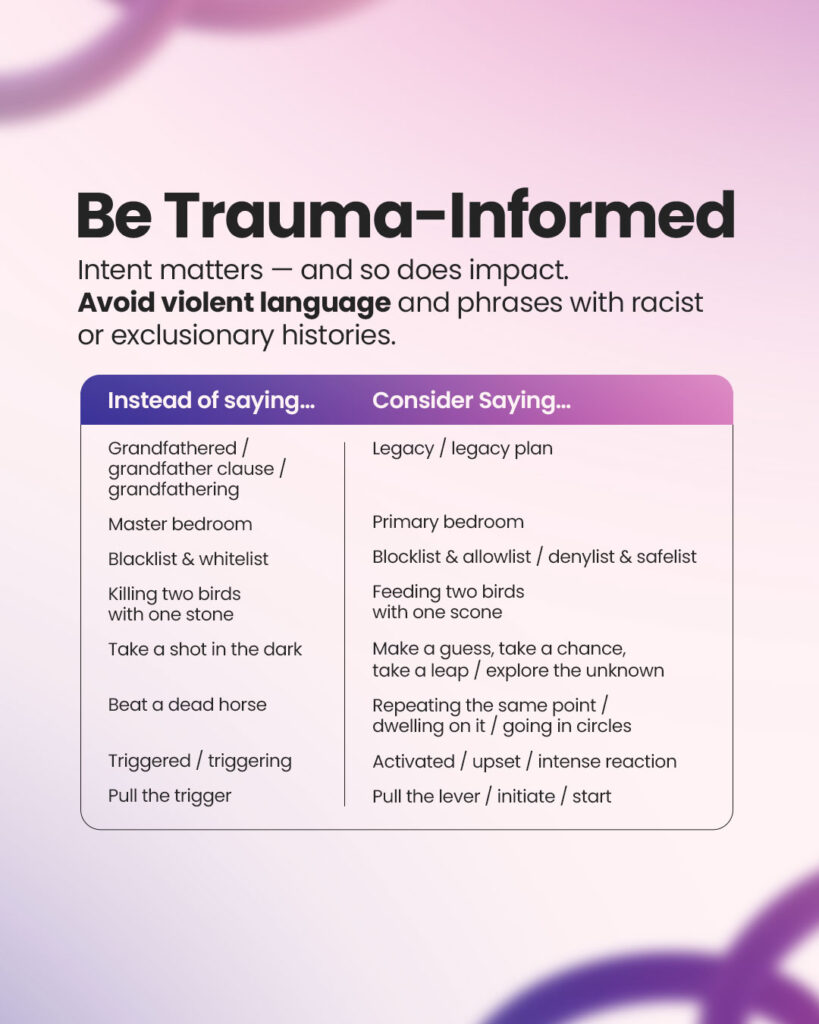
When we communicate, we don't always know what someone’s been through — and language that feels harmless to one person might be activating or retraumatizing to someone else. A trauma-informed approach to language centers choice, agency, and emotional safety.
It's not about walking on eggshells — it’s about leading with compassion and creating spaces where people can engage without feeling forced, shamed, or re-exposed to harm. Using trauma-informed language helps us build more supportive, human-centered communities.
Here are some common trauma-insensitive phrases and what you can say instead:
Instead of saying: Consider saying: Why it matters: Triggered / Triggering (casually) Activated / Upset / Intense reaction Keeps clinical terms respectful and avoids minimizing trauma. Safe space (if not fully safe) Brave space / Supportive environment Acknowledges that safety is co-created and not guaranteed. Suffering from trauma Living with trauma / Trauma survivor Centers agency and resilience instead of helplessness. Let’s dive deep Let’s explore this / We'll go at your pace “Diving” language can feel forceful or overwhelming. Push past your fear Work with the fear / Move gently through fear Respects pacing and emotional autonomy. This will transform your life This might support you / You may find this helpful Avoids unrealistic or high-pressure promises. No excuses / Show up no matter what Honor your capacity / You’re welcome as you are Reduces shame and acknowledges differing energy levels. You’re broken and need fixing You are whole / Let’s build on your strengths Affirms worthiness rather than framing people as broken. Committed suicide Died by suicide / Lost to suicide Reduces stigma by moving away from criminalized language. Hysterical Upset / Distressed / Activated “Hysterical” is rooted in sexist, pathologizing language. Killing Two Birds with One Stone Feeding two birds with one scone Avoids violent imagery and promotes more gentle, life-affirming metaphors. Take a Shot in the Dark Make a guess, take a chance, take a leap, explore the unknown Removes references to guns and shooting, reducing violent metaphors. Beat a Dead Horse Repeating the same point, dwelling on it, going in circles Avoids disturbing, violent imagery and focuses on the behavior, not harm.
Inclusive Language Guide: Next Steps
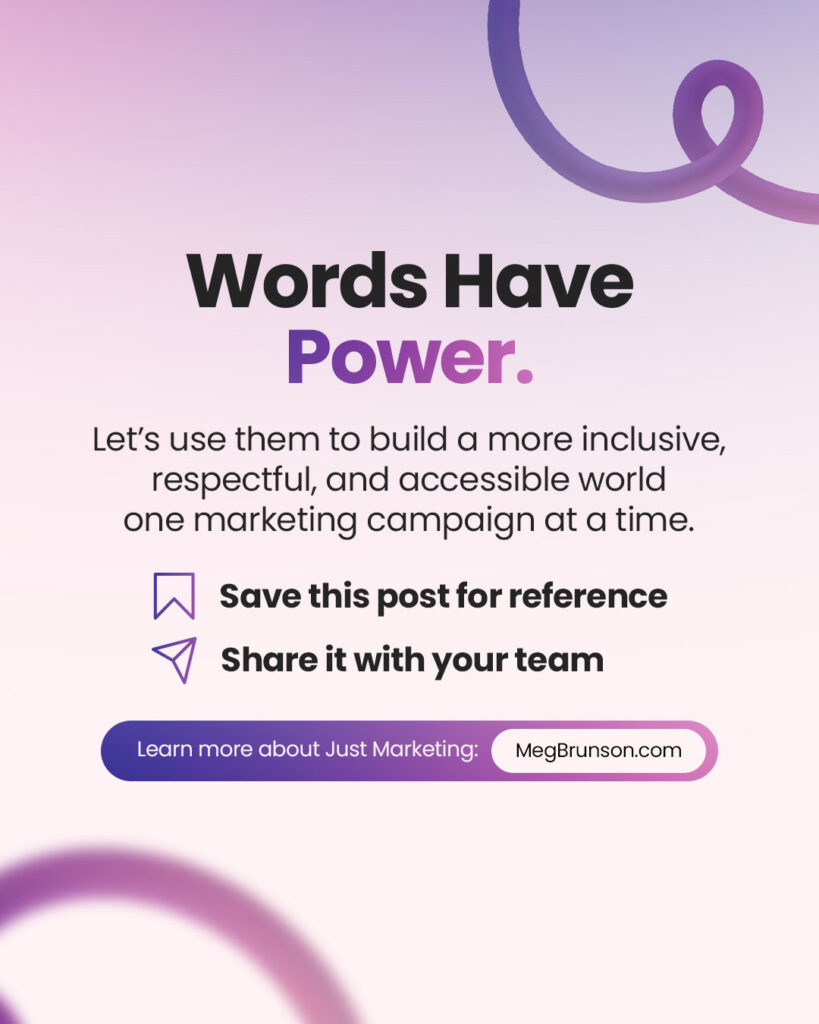
Language isn’t fixed — it grows, it shifts, and it adapts as we learn and unlearn. And that’s a good thing. Choosing inclusive, trauma-informed, and respectful language isn’t about being perfect; it’s about being present, mindful, and willing to do better when we know better.
Small changes in our everyday words can have a powerful ripple effect — building trust, deepening connections, and creating spaces where more people feel welcome, valued, and safe.
This Inclusive Language Guide is just the beginning. I'll be updating it regularly as language continues to evolve and as I learn from the communities leading the way.
Bookmark this page so you can come back anytime you want to check your language or refresh your approach.
And if you're ready to dive deeper, check out these resources on inclusive marketing and communication for even more ways to level up your impact:
- Your Words Matter — Just Marketing® Inclusive Language 101
- Marketing Representation Matters: How to Get It Right
- Inclusive Messaging: Marketing To A Diverse Audience & What To Do When You Mess Up
Together, we can make our words — and our work — part of the movement for justice, equity, and accessibility! 💕

